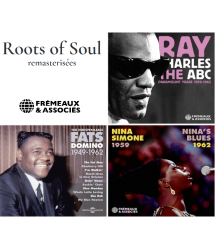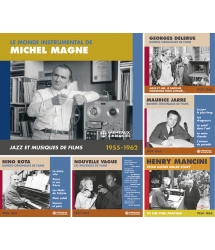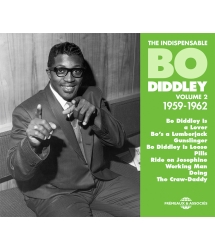‘Volume One’ was reviewed in B&R 272 and contained most of Bo’s biggest hits and best-known numbers, though ‘You Can’t Judge A Bnook By Looking At The Cover’ is on disc three here. This release starts with Bo having moved to Washington DC in 1959. The first few tracks find the Diddley Daddy in ‘Gunslinger’ mode – there is plenty of western flavour to the opening numbers like ‘Mule Train’, ‘Cheyenne’ and ‘Whoa Mule’, and ‘Siixteen Tons’ maybe adds a country touch, though Bo’s treatment is instantly recognisable. The blues is still there, as on the slight reworking of ‘I’Am a Man’ that is ‘Better Watch Yourself’. With ‘Doing The Craw-Daddy’, Bo is in the 60’s dance craze mode, whereas ‘Can You Shimmy ?’ is one of Bo’s comic narrative (of which there are several others here). ‘Working Man’ flits between blues and something akin to Sam Cooke’s ‘Chain Gang’ (which it predates), whilst Sam’s influence can also be heard on Bo’s excellent vocal towards the end of ‘Somewhere’. The remaining titles on the first disc and through the second and third discs tend to be generic Bo. However, that is still far more original, distinctive and interesting than that description might imply with lesser artists, even if he is frequently only reworking past glories – take a listen to the fine, self-referencing ‘Bo Diddley Is Loose’, ‘Hong Kong, Mississippi’, or even ‘Bo’s A Lumberjack’ with its echoes of, yes, ‘Sixteen Tons’. As the set progresses, a few contemporary elements sometimes creep subtly in, and the well-known ‘Mr. Kruschev’ is a patritic number inspired by the fear of a Cold War escalation of hostilities. On a rather less elevated level is ‘Mama Don’t Allow No Twistin’, a crude attempt to cash in on the dance craze, but ‘Meet You On A Saturday’ could qualify as proto-soul. It is interesting to note the development of bo’s guitar playing on instrumentals suc as ‘Sad Sack’, ‘Diddling’ and ‘Help out’. The eagle-eyed may have spotted that the track listing begins with material made in 1960 and continues chronologically ; the 1959 tag of the subtitle comes courtesy of ‘Cadillac’, wich was speeded up by Chess for its original release and is here slowed down back to its original form. Again, this collection is one of those where purchase depends on how much of this material you already have on your shelves. Mary of B&R’s more mature readers (are you saying some of our readers ar ‘immature’ Norm ? How dare you ! – Editorial team) will know this material backwards, but although I have always had a lot of time for Bo, this did make me listen more carefully to a lot of this material that I have previously tended to pass over rather swiftly, and I certainly enjoyed the experience far more than I expected. Norman DARWEN – BLUES AND RHYTHM











